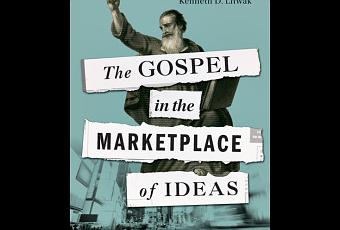 Can the Gospel compete with alternative worldviews?
Can the Gospel compete with alternative worldviews?
A review of The Gospel in the Marketplace of Ideas, P. Copan & K. Litwak, IVP, by Kara Martin
Available at Amazon.com
Earlier this year I preached about contextualising our gospel in response to popular culture, for which Acts 17:16–34 was the obvious model. Paul’s speech on Mars Hill is a sensational example of a deep understanding of the culture of the time, including their philosophers and poets. However, my sermon would have been much deeper if I had read this book!
Paul Copan and Kenneth Litwak have devoted their entire book to Paul’s short sermon. They examine the background, the cultural context, they analyse Paul’s every word, and they demonstrate how significant this text is to assisting us in proclaiming the Gospel to our pluralistic world.
They begin by comparing and contrasting the world of first-century Athens to the Western world, with our multiculturalism, the myriad of religious and/or philosophical options, and a relativism characterised in Judges 21:25 where “everybody did what was right in his or her own eyes”.
One of the features of the book is the way helpful information is set out in tables. There is a comparison, for example, between the Acts 17 sermon and Paul’s sermon at Lystra, recorded in Acts 14:15-17; demonstrating that Paul had the same basic message articulated differently for different audiences. The common elements are affirmation of God as creator and life-giver, the witness of God in creation, the ignorance of humans generally, and a call to repentance.
There is another helpful table demonstrating Theism’s greater explanatory power over naturalism according to a series of observable phenomenon. For example, we believe we make free personal decisions/choices, assuming humans are accountable for their actions. This is easily understood in the context that we are made in the image of a God who is a free being, who can freely choose to act, and who has imparted that to us. It is harder to explain if we have emerged by material, deterministic processes beyond our control; which is why Sam Harris has published a book questioning the ‘myth’ of free will. There was a funny moment during questiontime at a talk Harris gave when someone asked him how his wife feels knowing that Harris did not freely choose to love her!
Having demonstrated that Paul engaged with the influential ideas of his day in his sermon, the authors summarise the worldview influencers of our day including postmodernism, emotivism (I do what I feel is right), religious pluralism, and naturalism/scientism.
There is an extended analysis of Paul’s rhetoric in the speech to illustrate the flow of his ideas. This demonstrates that Paul not only used the philosophical terms familiar to his audience (rather than quoting Bible verses, a source they would neither recognise nor respect), but also that he used the logical argument techniques they were familiar with to convey his message.
Copan & Litwak conclude by looking at the key entry points for our own culture:
- Distinguishing between persons and beliefs. We can respect people but at the same time refute their worldviews or beliefs. The twin dangers of shooting down the messenger, or being overly tolerant of the ‘truth claims’ of others, only serve to confuse or dilute the Gospel.
- Describing the unknown God. Most people have a sense of the ‘god’, but are unsure how to describe or connect with ‘it’. This ‘unknown God’ has left his handprints in creation, and in our moral awareness.
- Signals of transcendence. We can appeal to the deep needs and longings of humans, as well as their intellectual curiosity. Earthly enjoyments do not fully satisfy, and we can explain that our deepest desires find their fulfilment in God.
- Evangelism and apologetics as a process. The authors have an intriguing table charting the journey from nonbelief to mature faith, starting at -9 with ‘suspicions of any truth claims’ to -5 ‘smug secularism challenged and shaken’ to -1 ‘seeing one’s need for Christ’. There is a moment of repentance and faith in Christ, which leads to +4 ‘beginning to think biblically about relationships and issues of integrity’ and the mature climax of +7 ‘developing one’s spiritual gifts, mentoring others, engaging the contemporary mind one person at a time’.
- Challenging the idolatries of our day including political, economic, philosophical, religious, technological or relational idols. They commend Tim Keller’s approach: “Instead of telling them they are sinning because they are sleeping with their boyfriends, I tell them they are sinning because they are looking to romances to give their lives meaning, to justify and save them, to give them what they should be looking for from God. This idolatry leads them to anxiety, obsessiveness, envy and resentment.”
- Jesus: the climax of our history and the fulfilment of our highest ideals. The authors commend us to show how the “redemptive stories in movies, wisdom in philosophy, virtues in the world’s religions and mythical stories… find their fulfilment and realisation in… Jesus.”
This is a very helpful primer for philosophical apologetics, as well as an examination of the culture into which we seek to speak truth and grace. If you want to understand how to address secularism more deeply, then Paul’s model from Acts 17, and the resources included in this book, would be an excellent foundation.
KARA MARTIN is the Associate Dean of the Marketplace Institute, Ridley College, Melbourne, and is an avid reader and book group attendee. Kara does book reviews for Eternity Magazine.











